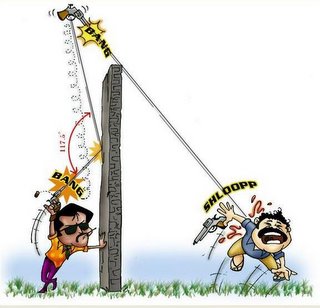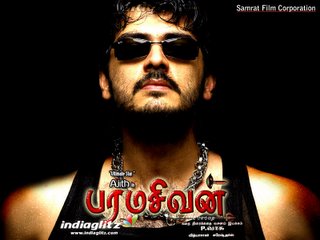Saarang
The jukebox was gone [why the fuck?] but the irritating 'junta', 'arbit', 'hazaar' and 'mochaan', 'da' being inappropriately used by Northies were still in parlance. Don't the kids move on?
Some observations....
- There was this street theatre group performing in 6 languages! They started and ended their play with these immortal verses from the great Bharathi
narai kUdi kizhapparuvam Eidhi
kodunkUtrukku iraiyAgum pala vEdikkai manidharaippOl
vIzhvEn endru ninaithAyO!"
- The powerchord and decibels [western music events as the events are euphemistically called], were dominated by noise producing metal heads. Whatever happened to good old pure rock? Rock is not just about hollering with guitars and drums producing only noise. Of course, there were exceptions. The group Panetella deservedly won the finals. They had everybody transfixed to their improvizations and medleys of The Beatles, Jimi Hendrix et all. They were the only band, if my memory serves me right, to play some classic and blues rock over the two days. These guys have got to be pros. For sure.
- JAM was incredibly funny, sometimes to the point of being wicked. Total fun nevertheless. More than the winner, the guy who finished 7th stole the show :)
- The locals [quintessential Chennai guys, who are characterized by their urge to indulge in some big time eve-teasing] were present in large numbers. More on them later.
- The classic rock performance by IIT-ians and one of their professors was a highlight. He could have been the lead singer of a rock band [even at his age!] and still be very successful. The Pink Floyd medley was God-level, maaan!
- Didn't get to watch the quiz finals, unfortunately.
- The rock show was a two-part affair with Parikrama opening and Led Zepplica following. Parikrama were great, barring their screw-up of Hendrix's "Purple Haze". Led Zepplica were definitely the next best thing to Led Zeppelin themselves. However, due to a fucked up Chennai law that public performances should not go on after 11PM, an IIT dean pulled out the power chords [literally] midway into the grand finale song, "Stairway To Heaven". Why didn't they begin the concert on time, in the first place? Why are deans and vice-chancellors like this? Manufacturing defect, i guess....





